The Liberals face a new test: aspire ... or expire
Beset by turmoil in the wake of its catastrophic defeat, the party faces a herculean task: how to stop a civil war.
The Liberal Party is facing a pivotal moment in its history. Following its spectacular defeat on May 3, the party of Menzies is now a movement riven by doubt and disbelief, instability and recrimination. But it is also one facing a deeper and more fundamental set of questions.
What and who does the party now represent? And what solutions can it offer, not merely for its own political revival but also for the expectations and demands of a changed and changing Australia?
How it rebuilds from here revolves around an elementary question: How does it reconstruct an aspirational agenda within the constraints of a damaged budget position that has made the basic features of such an agenda almost impossible to deliver?
Whether aspiration even still exists as a durable concept among competing generations of Australians is an even greater question.
Former Liberal prime minister John Howard tells Inquirer in an exclusive interview he will be “disturbed” if the Liberal Party doesn’t embrace aspiration as its core principle following its defeat.
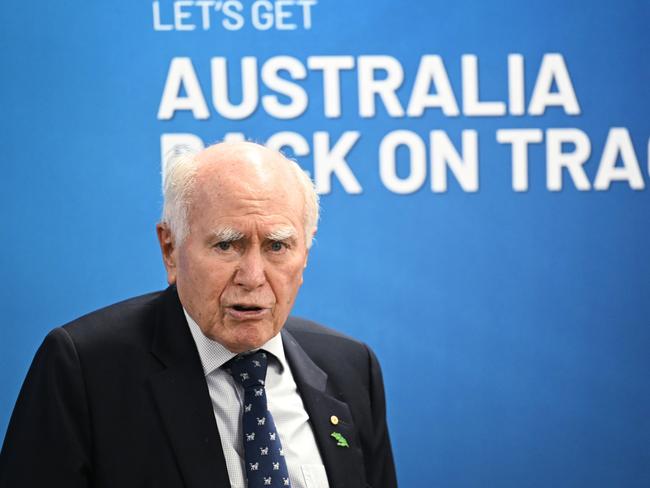
“Aspiration is fundamental to the Liberal Party’s values, it is fundamental to its beliefs,” Howard says. “It is a natural extension, it is a natural product of our belief in a society where individuals can achieve what they want in life.
“But it should not only be something that colours economic policy but also the desire to have choice in the education of your children as well as your own education.”
Howard’s view of aspiration borders the economic and cultural challenge now facing the party.
Peter Dutton has come under intense criticism on both fronts: the absence of an economic narrative and the deliberate shelving of an education agenda.
Yet Howard sees educational choice as being an equally foundational principle of the party’s notion of aspiration.
“It’s not just in economics, it’s right across the board; including education opportunity, to aspire to choose the form of education that best suits your children, and obviously access to high quality government schools is important, but so is the freedom to choose and the capacity to give effect to that choice in non-government schools. Aspiration is not just not economic, it’s about the aspiration of choice.”
If the election reduced the Liberal Party to ruins, this week’s leadership ballot has exposed the balkanised divisions that have emerged from the rubble.
Sussan Ley’s elevation as the first woman to be elected leader of the federal party, while a historic milestone to be celebrated, is encumbered by immediate and profound challenges.
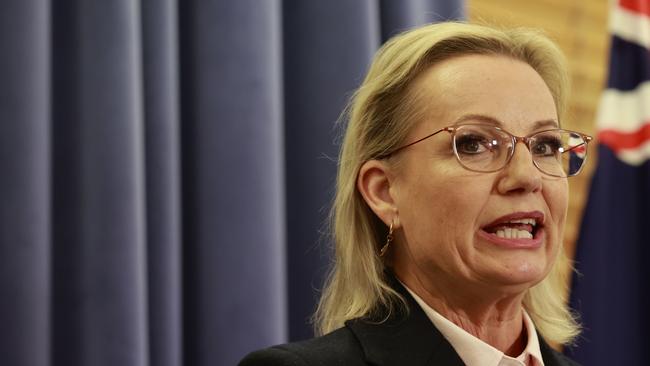
After July 1, when the Senate changes, the divisions within the party will be evenly split among supporters of Ley – those on the so-called moderate side of the party, the “transactionals” – and those who voted or would have voted for conservative former opposition Treasury spokesman Angus Taylor. The starting point for the party’s rebuild is marked by inherent instability, which is only amplified by a more sobering reality: most Liberal MPs in the partyroom have been reduced to margins in their seats of under 6 per cent. There are only three Liberal Party seats across the country that are now regarded as safe.
“A new agenda, and the sort of reform we are talking about, will require courage,” a senior Liberal MP tells Inquirer. “How courageous will a partyroom be when a hugely disproportionally large number of the partyroom are now marginal seat holders? … That makes for a very hard party to lead.”
The election of Ley, a regional Liberal MP based in the NSW border town of Albury, has already raised questions about the stability pact of the Coalition itself.
The so-called moderates – a label Ley rejects – are strongly of the view that the Coalition agreement should be abandoned in opposition on the basis that the Nationals place natural constraints on Liberal values. Net zero and competition policy are the most obvious points of difference.
Yet the irony of this is now the new reality for the Liberals. They have little representation left in the metropolitan electorates of the nation’s capital cities. In Melbourne, the party now holds only three; in Sydney only four.
And as the party retreats into the peri-urban and regional precincts, so has the leadership.
Not only is there instability within the Liberal partyroom, the natural divisions within the Coalition partnership itself have become more elevated, though there is little prospect of a formal split, despite posturing from some.
Energy policy, however, will remain an enduring debating point. Of all the elections during the past 20 years, climate change has been the thread that has unravelled both sides of politics. Labor at least has dealt with this internally. For the Coalition, it remains unresolved.
The question as to where it all went wrong cannot be confined to a single answer. There were numerous failures at all levels.
But the Coalition went to the 2025 election without an agenda that spoke to its fundamental support of an aspirational Australia. If it was trying to appeal to aspiration as a broad constituency, then this was its greatest failure.
Considering its commanding position at the end of 2024, many Coalition MPs remain bewildered by the result. It believed it was running strong on the key issues of economic management and cost of living, in the belief that it was appealing to aspiration over dependency. Newspoll had the Coalition on a primary vote of 40 per cent in November 2024 and leading Labor on the two-party-preferred vote.
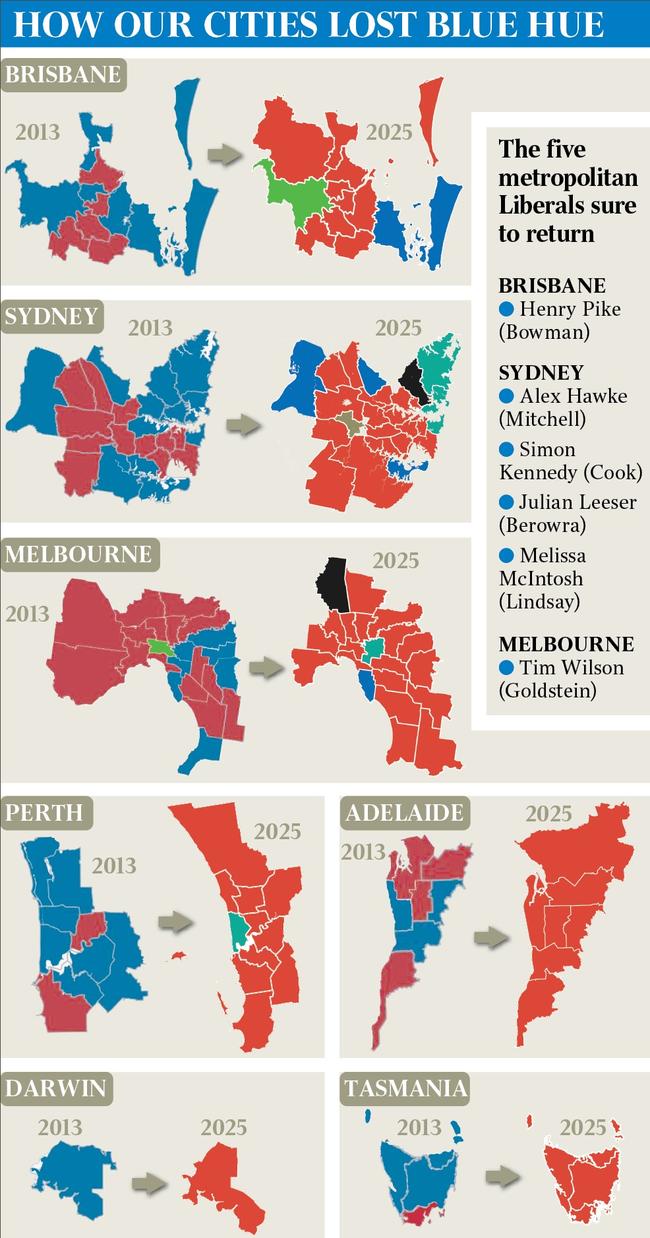
Taylor was convinced the Coalition was starting to win the crucial argument that reckless Labor spending, in the form of cost-of-living handouts, was the cause of the greatest post-war collapse in living standards.
Then something changed. A misreading of the national mood – and the internal polling – coincided with divisions that began to occur within the party itself. No one suggests it contributed to the loss. But those divisions have become increasingly evident as they converged around the party’s new leader, Ley.
Senior Liberal sources have confirmed Ley demanded that, following the resignation of senator Simon Birmingham, she be given the foreign affairs portfolio. Dutton refused amid concerns that Ley’s pro-Palestinian position and support for a ban on live sheep exports disqualified her from the role.
A rift emerged from January onwards. Those close to the process say this resulted in a sense of mistrust developing between the opposition leader and his deputy. Warring camps emerged, which went largely unreported and unnoticed, even by many colleagues internally. One source suggested Dutton’s office began to stop trusting everyone, including Taylor.
Sources close to Dutton accused Ley of beginning to disengage from the expenditure review committee process and the leadership group as a core group of NSW moderates began to throw their weight behind her. While Ley was still present at meetings, her input into policy and decision-making was said to be minimal, they say.
Others deny this strongly and point to several of Ley’s policies on skills and small business being driven through the expenditure review committee process and being announced during the campaign.
Whatever tensions there may or may not have been, it coincided with a further shift in posture from Dutton that became obvious from the start of the year. The party’s internal polling, which proved in the end to be catastrophically wrong, was suggesting the Coalition was ahead in at least 10 seats. The published polls also had Albanese at his lowest approval rating since becoming Prime Minister and Labor’s primary vote as low as 31 per cent.
A timidity fell over the entire Dutton camp. Policy that was well developed was shelved despite Dutton’s promise of a big and bold agenda. Instead Dutton began rubberstamping Labor spending promises, most notably on women’s health and Medicare.
“(Dutton) was being told they could win and didn’t want to get in the way of that,” says another source close to Dutton. “They fell for the notion that the election would be a referendum on Albanese’s failures.”
The Trump effect then changed the equation. Dutton proved incapable of dealing with this disruption. Labor capitalised on it, assisted by Coalition missteps such as the misguided and ill-timed release of its plan to force public servants back into the office.
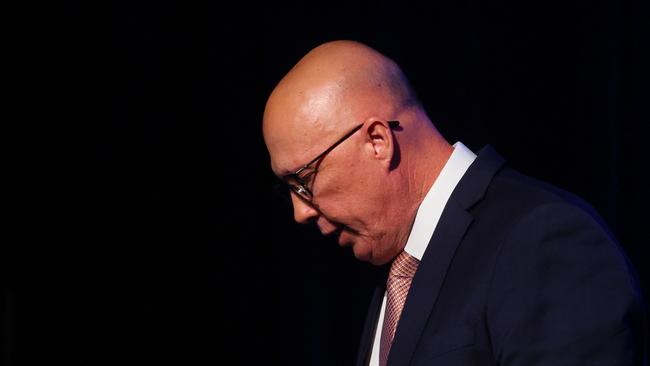
By the time of the budget, tensions between Dutton and Ley’s office were becoming apparent, according to one source. Again this is denied by those close to Ley. But there is no doubt backbenchers were also concerned that Dutton and Taylor were failing to prosecute the economic case. This was a week before the start of the official campaign. The so-called rift came at precisely the wrong time. And it was amplified during the campaign.
A senior source in the Dutton camp recounts an incident during the campaign involving a domestic violence announcement the Liberal leader was planning to give in Tasmania. This involved flying the VIP RAAF business jet from Perth.
Ley was asked to attend. According to one account, Ley wanted the plane diverted to collect her from Griffith. This was not possible because of the size of the aircraft. Dutton’s office was then forced to commandeer a smaller RAAF jet to fly in to collect her.
Others dispute this account and say Ley had prior commitments in Griffith and was trying to work with Dutton’s office to work out how she could also get to the announcement in Tasmania.
Some say this incident only intensified a sense of paranoia. But others claim the relationship between the two offices had always worked well and the notion that there was tension is an invention by those seeking to cause trouble after the election loss. All this points to the degree of blame and recrimination that MPs and players from both sides within the party are now trying to apportion.
While Dutton was facing a highly effective Labor campaign that successfully portrayed him as unelectable – particularly with women – Ley, as deputy leader, is not blameless in the defeat.
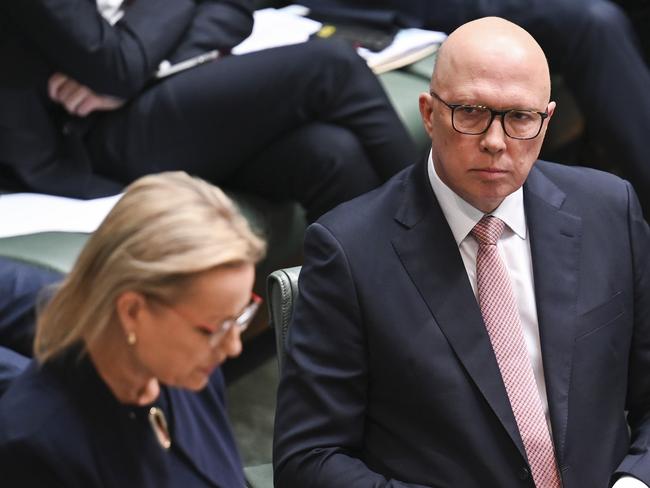
Most in the partyroom agree she should be given every opportunity, as the new leader, to reunite the party and lead the reconstruction. But it is the fragility of her authority that cannot be ignored. Unlike Dutton, who led the party through one of its most stable periods of opposition, Ley has challengers waiting in the wings: Taylor, Tim Wilson and Andrew Hastie all have aspirations.
A residual animosity towards her also will remain among some of the party’s conservatives. There are claims about the role her supporters played in undermining colleagues, including Dutton himself. Ley will have to overcome all this while also trying to redefine what the party stands for.
Former Liberal prime minister Tony Abbott tells Inquirer the management of this dilemma is among the chief failures of the Dutton enterprise.
“The Liberal Party has always been the party of aspiration: the party that wants to help and encourage those eager to get ahead and make the most of themselves,” he says.
“And that should never change. Unfortunately, at the last election we didn’t have enough policies that reflected our support for aspirational Australians.
“Indexing the tax scales to end tax increases by stealth would have been a good start but we never actually committed to it. I suspect the new leadership knows that the policy offering will have to be more substantial next time.”
While there are obvious and immediate issues to be addressed for the parliamentary and organisational wings of the Liberals – principally how the party allowed a defeat of this magnitude to occur – the deeper and fundamental issue under examination is the idea of what aspiration now represents.
“You can look at it in two ways,” says Liberal MP Dan Tehan, recognising that for the first time a generation of Australians believe they will be worse off than their parents. “Is the reason aspiration is dead because young people see it as unobtainable? Or how do you instil hope again … that hard work can lead to a better life than your parents had. That is the big challenge. What is it that people aspire to?”
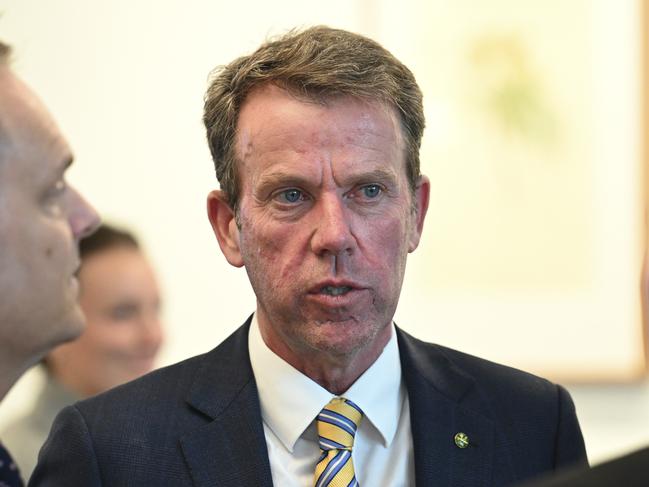
This is the unresolved issue for the Liberal Party as it seeks to rise from the ashes of defeat. Tehan says his colleagues must look “deeply into the heart of the party itself”. “That means an honest look at the 2025 election, our history and the future,” he says.
But that requires an understanding of the world that now confronts it and the tensions between what a weakened budget and anaemic economy can deliver and the expectations of the community. The Coalition is now constrained by the realities of the budget position that Labor has allowed to deteriorate.
The indexation of personal income tax that Abbott refers to becomes impossible to deliver against $178bn in budget deficits without unpalatable spending restraints that will inevitably annoy some people. This is the trap Labor has set for the Coalition. Without a huge growth period, the sort of aspiration deliverable for a Coalition becomes almost unattainable. And with the global turmoil caused by Donald Trump, it is difficult to see where that growth comes from in the short to medium term.
“The last three years have been critical,” another Liberal MP says. “The measures put in place during Covid were always temporary. If we were elected in 2022, we would have finished the job of restoring the balance sheet. Labor has done the opposite. They have now trapped us from delivering an aspirational agenda.”
There is no doubt the country has changed post pandemic. The community experienced the length and depths of government intervention into every aspect of their lives.
This shifted voters into a self-protective position with economic security being reinterpreted as what role the government played in supplementing their incomes rather than driving aspiration. Labor exploited this from the moment it took office in 2022.
Albanese sees a primary and permanent role for the state in the economy and society. His historic election victory will vindicate a belief that this is a dependency model now embraced by the majority of Australians.
This cycle has been woven into the fabric of the collective national response to periods of crisis and prosperity throughout Australia’s history. And this is the new challenge for centre-right politics globally. The recent obsession with the cultural contest has overlooked its primary role and ignored where community expectation has shifted.
Critical to the Liberal Party’s recovery story remains its reassessment of the central guiding principle of aspirational economics and politics – as Howard says, the freedom of choice – and how this can be applied in three years when Australians may be living in a distinctly different world.



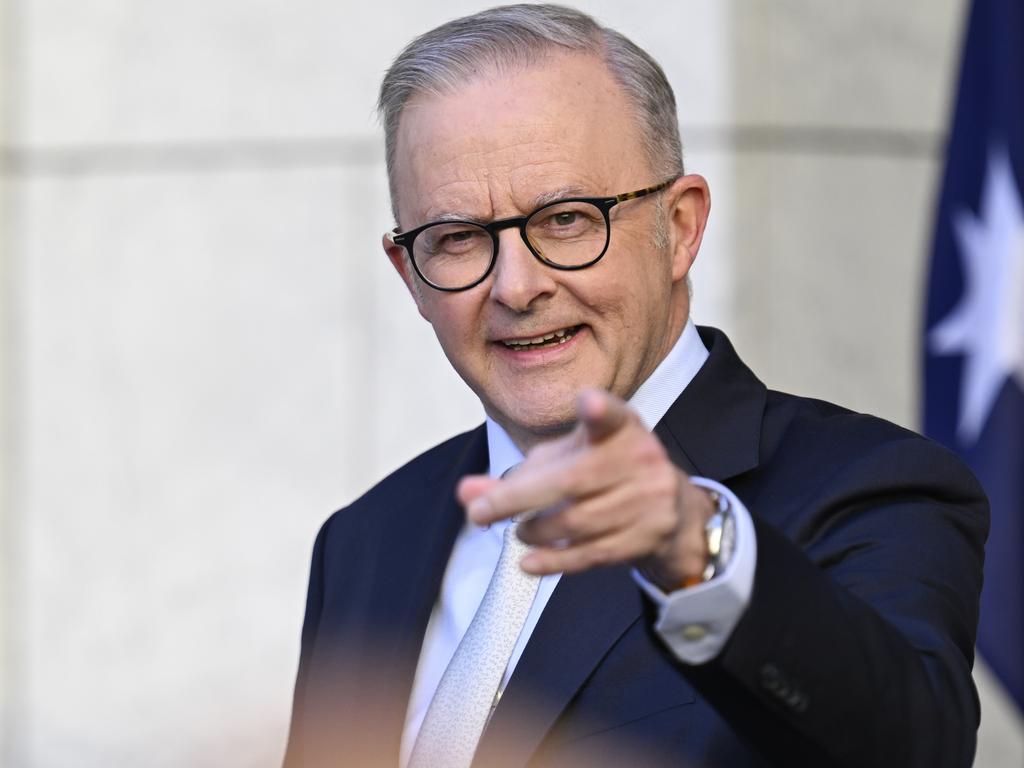
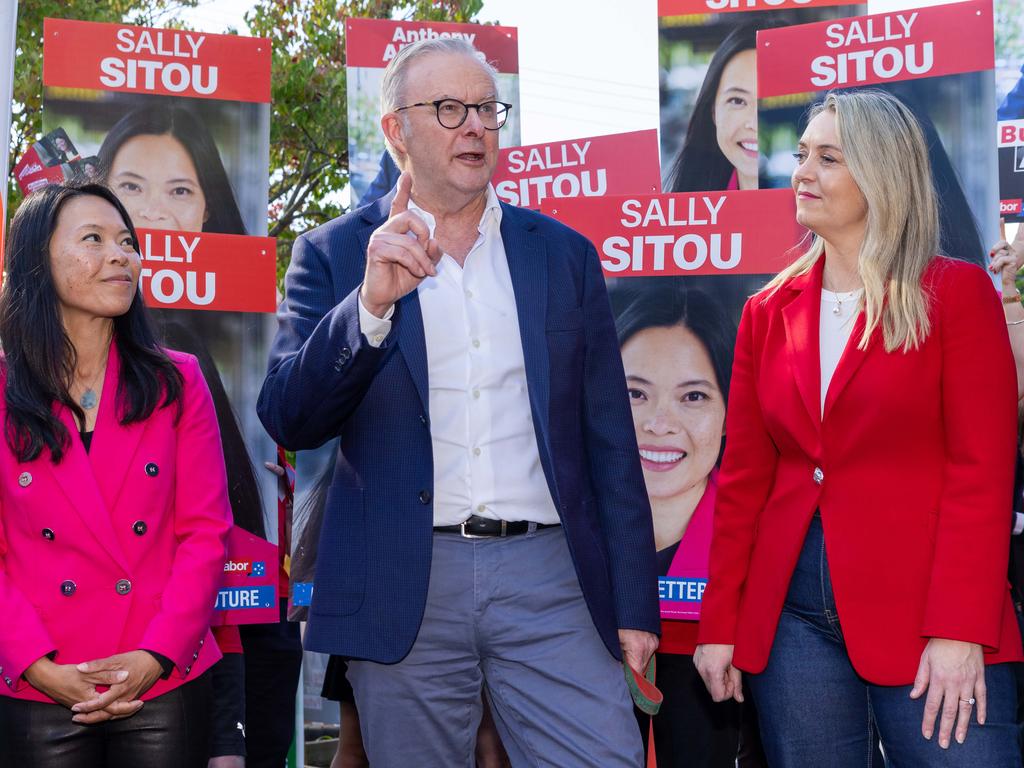
To join the conversation, please log in. Don't have an account? Register
Join the conversation, you are commenting as Logout